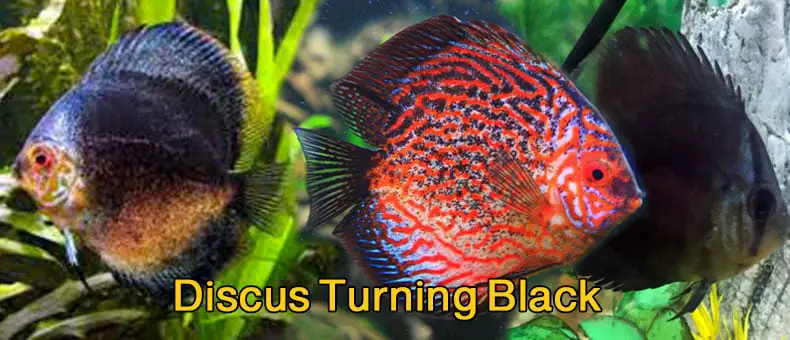
Discus turning black is evidence that your Discus is either sick, infected by a parasite, bacteria, fungi or it is extremely stressed and maybe adapting to its environment. Long-term stress can make the fish prone to infections, so you should be on the lookout for any form of stress.
Table of Contents
- Discus Turning Black Symptoms
- Discus Turning Black Disease Description
- Discus Turning Black Treatment Steps
- Discus Turning Black Prevention Tips
- Conclusion
Discus Turning Black Symptoms
Below are mixed symptoms of Discus turning black or dark color due to different causes and diseases, so you might not find all the below symptoms at one time in a Discus.
- Discus turning black or dark in color, mostly in her blue and brown strains.
- Increasing black spots and peppering on the Discus body.
- Discus color changes to a darker color.
- Infected Discus will have heavy breathing, like three breaths per second.
- A change in behavior, the Discus may start moving up and down randomly in the tank this symptom is common in the early stages of the illness.
- Staying in the dark corners of the tank.
- Leaning to one side at the top or bottom of the tank.
- Loss of appetite, being shy, hiding behind aquarium decorations, and filters.
- Clamped fins.
- Production of slim coat and excess mucus.
- Scratching and rubbing their body against aquarium objects; darting and twitching can also be observed.
- May also see Columnaris or Severe fin rot or both.
- White patches and points on the Discus body are usually caused by a secondary infection like; external parasites, bacteria, and fungi.
- Smelly and cloudy water as a result of excess slim coats and protein in the aquarium.
Discus Turning Black Disease Description
What Causes A Discus To Turn Black?
There are many reasons why your Discus fish might turn into black color or darker color such as:
[1] – Environment adaptation (Black Peppering)
Discus fish is sensitive and should be treated as such, the first step of care in the Discus is their habitat which can influence their color and cause them to turn black as an adaptive reaction.
Due to the fact that Discus fishes like to look like their environment, they most likely will change to the color of their environment when the environment is a dark color.
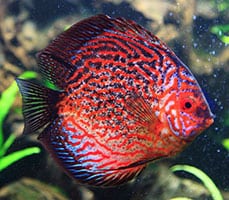
A Discus fish will be having small black dots on her body called black peppering which sometimes become too much in a bigger amount causing black patches or areas on her body.
[2] – Discus Stress
You can have a black Discus in your tank as a result of stress caused by high levels of ammonia, nitrate, and nitrites in the tank.
Discus fishes are schooling fishes, and they can get really stressed when they are alone in the tank or when they are not many fishes in the tank.
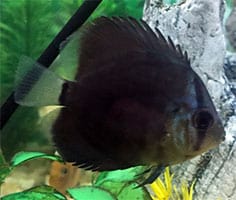
[3] – Bacterial Infections
Bacteria infection is one of the reasons your Discus turn really dark, there are other reasons though, but because this is critical and dangerous it should be attended to as fast as possible.
The bacteria infection can be cured effectively when it is discovered and treatment commences at the early stage.
You will be able to save your Discus and prevent them from bacteria infection by boosting their immune system to fight the bacteria, feeding them a quality diet, and giving them comfortable and stress-free water and tank condition.
[4] – Diseases And Parasites
Bacteria infections always follow parasitic invasion in your tank but it can also be caused by poor diet and removal of fish’s protective mucus membrane or scales during netting opens the fish to Bacteria infection which can make your Discus go really dark.
Discus turned dark can be a result of disease caused by bacteria, parasites or it could even be viral leading to diseases like Discus plaque, also known as Discus black disease.
Diseases are one of the major reasons why your discus will turn dark with other symptoms like bloody patches, white film on the fish’s body, tattered fins, cloudy eyes.
And If the fish is previously infected with a parasite it can lead to bacterial infection.
[5] – Marble Discus
This is a new Discus breeding especially they are commonly known in China, they have the black areas when they get born.
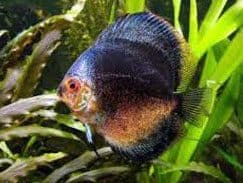
[6] – Black-Stripe Syndrome
This is a ciliated protozoan that attacks fish including discus fish. It is called Cryptobia. This is an internal disease of the fish where the Cryptobia organism is creating granulomas in the Discus.
In general, below are possible causes of Discus turning black:
- Dark environments.
- Poor water conditions.
- High ammonia, nitrate, and nitrite level in the water.
- Stress.
- Discus black disease (caused by a virus called herpes).
Discus Turning Black Treatment Steps
The following are how to treat Discus turning black both the non- disease cause (environment) and disease cause.
Environment Cause Treatment
[STEP1] – Change To Lighter Environment
Change the dark environment to a lighter one to eliminate the peppering effects.
The most preferred color of the environment is a light blue background and a whitish bottom.
[STEP2] – Feeding with high-quality food will further help
Stress Treatment
There are many ways to treat Discus stress depending on the cause of that stress, it could be bullying by other fishes, poor water quality, disturbance, wrong water temperature… etc.
If you believe your Discus fish is turning black because it’s being stressed, then better to check my other step by step tutorial on how to treat all types of Discus stress.
Bacterial Infection Cause Treatment
[STEP1] – Quarantine Infected Discus Fish
[STEP2] – Perform 50% Water Change
Perform a 50% water change every two days of giving the medication, if in the medication stated different than that, then better to follow the medication instructions.
[STEP3] – Wipe Down All Sides Of The Tank
And also wipe the bottom of the tank, the air stone in your tank should be more than enough.
[STEP4] – Add Aquarium Salt
Add a dosage of 1 teaspoon of aquarium salt for every 10 US gallons, mix it in water before pouring it into the tank.
[STEP5] – Treat With API Melafix
Correct diagnosing the particular bacteria that is affecting your Discus fish is almost not possible, your treatment will mostly be on a general basis, treating for Bacteria generally may not always work, but specific medications are always effective.
One of the most effective medications to treat general bacterial infections in Discus fish is the API Melafix, you may check its price on Amazon.

Follow the instructions in the Melafix box for the dosage and steps of treating to get rid of any common known bacterial infections in your Discus.
Disease/Parasitic Infections Treatment
The below steps are to treat generic parasitic or disease infections, if you are looking for a specific infection treatment then better to search Discusrescue.com for the specific disease infection or parasitic treatment.
[STEP1] – Quarantine Infected Discus Fish
[STEP2] – Perform 50% Water Change
Perform a 50% water change every two days of giving the medication, if in the medication stated different than that, then better to follow the medication instructions.
[STEP3] – Wipe Down All Sides Of The Tank
And also wipe the bottom of the tank, the air stone in your tank should be more than enough.
[STEP4] – Increase Water Temperature
Increase the temperature of the water to about 92º Fahrenheit; this will increase the metabolic function of the Discus fish and also boost the immune system of the fish.
[STEP4] – Add Aquarium Salt
Add a dosage of 1 teaspoon of aquarium salt for every 10 US gallons, mix it in water before pouring it into the tank.
[STEP5] – Treat With API General Cure Powder
Use a treatment that is generally used for all parasites, fungal infections are more effective such as API General Cure Powder, check its price on Amazon.
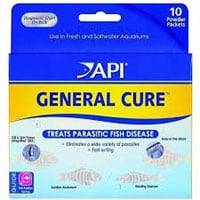
Broad-spectrum antibiotics like ciprofloxacin can help to prevent, control, and treat many types of bacterial infections.
[STEP6] – Feed Your Discus With Quality Food
Discus Turning Black Prevention Tips
- Maintain a good water condition, perform water changes of about 25% – 30% weekly.
- Constantly enhance the immunity of your fish.
- Maintain proper temperature of 82-86°F.
- Clear Excess food from your aquarium as fast as possible.
- Always quarantine new fishes before transporting to the main tank.
Conclusion
Having known that Discus turning black could be caused by a disease and may not be caused by the disease too, The most important thing is to make sure your tank water, fish diet, and the whole tank Condition are conducive for your Discus fish, and then avoid leaving left overfeeds in the tank and you’ll be sure to protect your fish from turning black and other stress factors that follow it.


How can I get ahold of you to show you a pic of my discus to see if you can help me figure out what is wrong?
Share the picture 🙂
My fish is a blue Diamond Discus, turning black, then at times back to somewhat normal color. No evident ailments, but not eating. I e checked levels seem to be fine…
I stress her out clearly her water and am at a loss. We care for our fish any trouble shooting ideas from your experience would be welcomed and appreciated..
Would like to send a pic, I don’t know what else to do….
How do I post a picture?
Hi Kelly,
What is your question in the picture regarding Discus getting black? 🙂
Please help me with my discus I am new to this hobby and kinda got thrown these beautiful fish without knowing anything about fish especially discus my tank isn’t even cycled there are turning black darting at each other I have 13 discus in a 70 gallon tank ammonia is good but the nitrite is bad can you please me know if my fish might have infection thank you
Hi Tiffany,
Discus is a very sensitive fish, there are certain things if you follow them you are good to go with this hobby, I advise you to check the below article of mine of how to keep a healthy Discus:
5 Main Tips On How To Keep Healthy Discus – Practical Guide
Also, I advise you to read other articles for basic keepers to get educated quickly and easily all about Discus fish from the below link:
Discus for Dummies
Hope this helps.
Firas
Good afternoon,
We have 3 discus fish in a 90 gallon tank. Our blue turquoise fish has turned a dark color. He had an infection about 1 1/2 ago. We quarantined him and treated the infection in the main tank and where he was placed. He is back in the main tank but we noticed has turned a dark color. Could this be it still has the infection or is it the condition of the water?
My 4 discus are very healthy but one has the pepper spots… had the for 2 years… 55 gal tank. Have 3 angels and a red tailed shark, 4 glow tetras